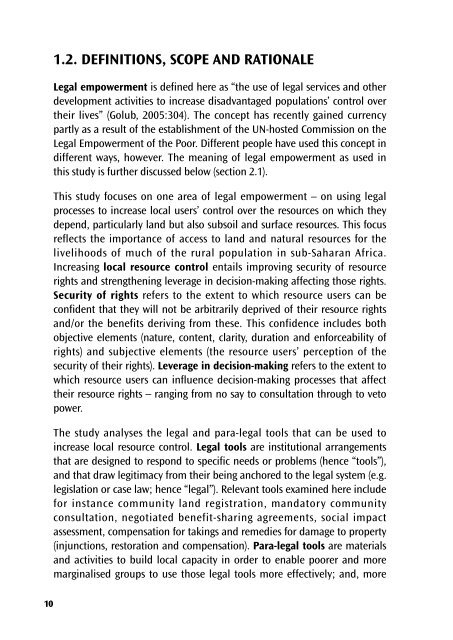Legal empowerment for local resource control
Legal empowerment for local resource control
Legal empowerment for local resource control
Create successful ePaper yourself
Turn your PDF publications into a flip-book with our unique Google optimized e-Paper software.
10<br />
1.2. DEFINITIONS, SCOPE AND RATIONALE<br />
<strong>Legal</strong> <strong>empowerment</strong> is defined here as “the use of legal services and other<br />
development activities to increase disadvantaged populations’ <strong>control</strong> over<br />
their lives” (Golub, 2005:304). The concept has recently gained currency<br />
partly as a result of the establishment of the UN-hosted Commission on the<br />
<strong>Legal</strong> Empowerment of the Poor. Different people have used this concept in<br />
different ways, however. The meaning of legal <strong>empowerment</strong> as used in<br />
this study is further discussed below (section 2.1).<br />
This study focuses on one area of legal <strong>empowerment</strong> – on using legal<br />
processes to increase <strong>local</strong> users’ <strong>control</strong> over the <strong>resource</strong>s on which they<br />
depend, particularly land but also subsoil and surface <strong>resource</strong>s. This focus<br />
reflects the importance of access to land and natural <strong>resource</strong>s <strong>for</strong> the<br />
livelihoods of much of the rural population in sub-Saharan Africa.<br />
Increasing <strong>local</strong> <strong>resource</strong> <strong>control</strong> entails improving security of <strong>resource</strong><br />
rights and strengthening leverage in decision-making affecting those rights.<br />
Security of rights refers to the extent to which <strong>resource</strong> users can be<br />
confident that they will not be arbitrarily deprived of their <strong>resource</strong> rights<br />
and/or the benefits deriving from these. This confidence includes both<br />
objective elements (nature, content, clarity, duration and en<strong>for</strong>ceability of<br />
rights) and subjective elements (the <strong>resource</strong> users’ perception of the<br />
security of their rights). Leverage in decision-making refers to the extent to<br />
which <strong>resource</strong> users can influence decision-making processes that affect<br />
their <strong>resource</strong> rights – ranging from no say to consultation through to veto<br />
power.<br />
The study analyses the legal and para-legal tools that can be used to<br />
increase <strong>local</strong> <strong>resource</strong> <strong>control</strong>. <strong>Legal</strong> tools are institutional arrangements<br />
that are designed to respond to specific needs or problems (hence “tools”),<br />
and that draw legitimacy from their being anchored to the legal system (e.g.<br />
legislation or case law; hence “legal”). Relevant tools examined here include<br />
<strong>for</strong> instance community land registration, mandatory community<br />
consultation, negotiated benefit-sharing agreements, social impact<br />
assessment, compensation <strong>for</strong> takings and remedies <strong>for</strong> damage to property<br />
(injunctions, restoration and compensation). Para-legal tools are materials<br />
and activities to build <strong>local</strong> capacity in order to enable poorer and more<br />
marginalised groups to use those legal tools more effectively; and, more

















